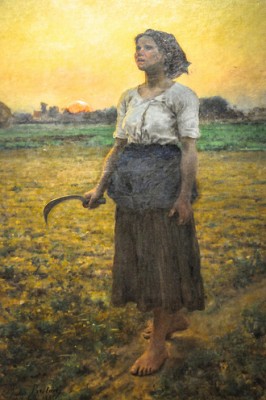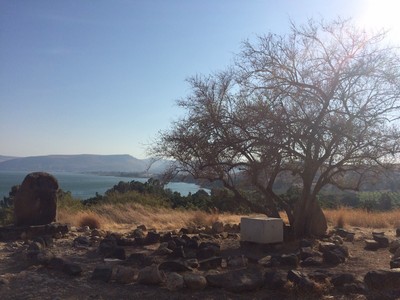Regenerations/13 - Both Saint Francis and Job are inhabitants in it. Just as children.
by Luigino Bruni
published in Avvenire on 25/10/2015

you're scared
of poverty,
you don't want
to go to the market with worn-out shoes
and come back with the same old dress.
My love, we are not fond
as the rich would like us to be,
of misery. We
shall extract it like an evil tooth
that up to now has bitten the heart of man."
Pablo Neruda, Poverty (English translation by Donald D. Walsh)
For two millennia the ‘Sermon on the Mount’ has been trying to resist the attacks of those who have tried to reduce it to something else, to turn it into ridicule or an unnecessary comforting exercise. This fight against the simple radicalism of the beatitudes is particularly clear and strong in the case of the blessedness of the poor.
The process of downsizing its scope started very early, when too much stress was appropriated to the ‘in spirit’ that we find in the Gospel of Matthew, leaving ‘poor’ more and more in the background, relying on new and creative exegeses of that beatitude. So we have written and said that the ‘blessed’ ones are not the poor but those who live a true spiritual detachment from riches, those who share the goods or use them for the common good. All these things are true and present in the Bible, too, but they turned us away from the very simple and tremendous statement of ‘blessed are the poor’.
It is not easy to understand and love this first beatitude. The first and almost insurmountable obstacle is the real and concrete condition of the actual poor: how can we call them blessed when we see them distorted by poverty, abused by the powerful, dying in the sea, being left to their fate on the peripheries of our cities? What happiness do they know? It so happens that the biggest critics of this first bliss are those who spend their lives to liberate the poor from their misery. The greatest friends of the poor often end up becoming the greatest enemies of ‘blessed are the poor’.
If we want this first beatitude to be able to reach us, to love and change us, we need to cross through this paradoxical, outrageous and even manipulative terrain - how many rich people found and used the bliss of the poor as a spiritual excuse to leave them in their blessed conditions of deprivation and misery, or how many were those who defined themselves as ‘poor in spirit’?! We must not make the very common mistake of reducing the range of this curious type of happiness to make it fit in our categories, by amputating (as in the myth) its legs sticking out from our beds that are too short. The paradoxes of the gospel and life are not solved by reducing them, but by ‘making the bed longer’, forming categories that ‘measure up’ to them.
A first clue to step deeper into the first beatitude is found in the text itself: it is  the Kingdom of heaven. The happiness of the poor consists in living in the Kingdom already. The kingdom "is" theirs now, it's not something they "will" have tomorrow. The beatitude of the poor does not need the “not-yet”.
the Kingdom of heaven. The happiness of the poor consists in living in the Kingdom already. The kingdom "is" theirs now, it's not something they "will" have tomorrow. The beatitude of the poor does not need the “not-yet”.
The poor are blessed because they are residents of the Kingdom of Heaven. This sentence in itself would be enough to understand, or at least make a close guess of the meaning of this beatitude that, not surprisingly, is the first one. Among the poor called blessed there were those who are rejected, the homeless, those who had little or nothing to live on. But this is where the lepers, widows (and almost all women), orphans (and almost all children) also belong, all these people who, not surprisingly, were the closest friends and companions of Jesus during his life. Most of his disciples came from among the poor: they met him in the streets of Palestine, they were ordinary people like us, who started to walk behind him and together with him. They were already poor or became poor having glimpsed another kingdom, following another type of happiness. In saying ‘blessed are the poor’ Jesus spoke to his people, and he still does.
Only the poor live in the Kingdom of Heaven, in that kingdom inhabited by the men and women of the Beatitudes: the meek, the pure, those persecuted, the merciful, those hungry for justice, the afflicted and the poor. A kingdom different from those that govern our society, but one that has never stopped being in our midst. A kingdom where you get to know the kind of Providence only the poor experience: Providence is for Lucia, not for Don Rodrigo. Holidays are the most beautiful celebrations of the poor: perhaps there is nothing more joyous on this earth than weddings and births celebrated by the poor among the poor. Children love parties and gifts because - and until - they are poor.
The rich do not enter into this kingdom, not as a punishment, but simply because they do not understand it, they do not see or want it. They are interested in the kingdoms of the earth and not that of heaven. If the Kingdom of Heaven belongs to the poor, then it does not belong to the rich, unless they become poor leaving their idols behind. The kingdom of heaven is the place of non-predatory relationships with things and with people, where the golden rule is gratuitousness.
Throughout history there are some who have tried to take this bliss seriously. One of these is Saint Francis of Assisi, who has revealed what ‘blessed are the poor’ means more than anyone. Francis is this beatitude incarnate, the word made flesh. The one Francis followed is not the only way to enter the Kingdom as poor, but after the “poverello” (pauperculus, the "little poor man") one can no longer do without his poverty to really understand the one of the beatitudes. If it were not so, the charismas would only be private experiences, useless for the humanity of everyone and every age. Francis is the great and eternal master of the beatitude of poverty, the joy of a different kingdom. Whenever someone chooses to become poor again they meet Francis, although they do not recognize him (he met Jesus in the leper and he did not know, all those who become poor by choice also meet Francis, even though they do not know).
Not all Christians and not all men choose “Our Lady of Poverty”, but the typical joy of real - and not ideological - poverty is only known by Francis and those who are like him. That cosmic brotherhood, the Canticle of the Creatures, that absolute freedom, those kisses to the mouth and hands of lepers, the perfect joy can only come from those who are inside that bliss and live in a different kingdom. It is not mandatory to be poor, not even in the church: the rich are not excluded from the sacraments, they are often praised and thanked by the poor themselves. They have always been part, legitimate and even important part for the Christian communities. They live longer, with better education and health, they collect achievements and applause. But they are not citizens of that kingdom, they do not know those heavens, they cannot see those distant and beautiful stars. There is this kind of justice in this world, too, and it's great.
 But that's not all. The joy of Francis was born from poverty by choice, and his happiness is obvious to those who choose it and also to those who watch it. But the poor who followed Jesus were not only those who became poor by choice. There were so many who were just-poor-and-that's-all, people that did not choose poverty, but found themselves in it since the day they were born, or who had become poor as a result of an illness or misfortune. Among those who are called the blessed poor there were some like Francis, but there were also many "Jobs", that is, those people who were poor not by choice but by fate or misfortune. The amazing strength of the first beatitude is in its turning to the poor: those who were like Francis and those who were like Job. Both are called the inhabitants of this different kingdom. And if the kingdom is theirs, they are not subjects in it but sovereigns.
But that's not all. The joy of Francis was born from poverty by choice, and his happiness is obvious to those who choose it and also to those who watch it. But the poor who followed Jesus were not only those who became poor by choice. There were so many who were just-poor-and-that's-all, people that did not choose poverty, but found themselves in it since the day they were born, or who had become poor as a result of an illness or misfortune. Among those who are called the blessed poor there were some like Francis, but there were also many "Jobs", that is, those people who were poor not by choice but by fate or misfortune. The amazing strength of the first beatitude is in its turning to the poor: those who were like Francis and those who were like Job. Both are called the inhabitants of this different kingdom. And if the kingdom is theirs, they are not subjects in it but sovereigns.
But while it is relatively easy to grasp the happiness of Francis, to call the many Jobs of the earth and history ‘blessed’ is a very difficult and painful operation bordering on the absurd, belonging to the realm of the paradox. But if we don't include Job, too, in that ‘blessed are the poor’, we reduce its range too much and we transform it into an ideology. We have to understand it and repeat it in the joy of Assisi but also next to the many ‘dung heaps’ where the poor of Job's kind live and dwell. Beatitude has to be true even for those who did not choose poverty but have only suffered it. The Kingdom of Heaven is and must be the kingdom of both Francis and Job, and of the two of them together. Those who are poor by choice should be right beside those who are just poor and that's all: all of them brothers, all blessed. It is not feeling happy that makes us blessed: bliss arises from the objective condition of being poor. It is not a feeling, it is a being, a living. There is no friendship that's more real and greater than the one between the Francis-like poor and the Job-like poor. To come across it it’s enough to go to a few missions in Africa, but also to Termini or Ostiense Railway Station in Rome where many poor people live and see how they hug each other and 'dance' together, all different and all equal citizens of the same kingdom.
The book of Job told us, at a high cost, that even the poor can be righteous and innocent - let's not forget that in that world, just as in ours, wealth was a sign of blessing and poverty was that of curse. The gospel goes out to meet Job and all the poor and announces them something new and immense: ‘You are not only innocent, you are also blessed.’ The dung hill remains, but from that day bliss comes to them as well, which has redeemed an endless story of poor people condemned by the religions of the rich of yesterday and today.
The beatitude of poverty may arrive late, very late in the life of righteous people: sometimes it is the last beatitude. To get a glimpse of another kingdom one must walk a lot, and if life lets us be born and live in the richness and abundance of goods and talents, it takes a lot of effort, a lot of testing and a lot of pain and love to be able to reach the beatitude of poverty. Often it takes all our life, and sometimes not even that is enough to become poor again finally, to be children and ‘naked’ just as we came to the world, and to recite the greatest prayer at the end: ‘Naked I came from my mother's womb, and naked shall I return. The Lord gave, and the Lord has taken away; blessed be the name of the Lord.’ (Job 1,20-21) It is possible to go back to being poor, to return to poverty. The doors of the Kingdom are always open and waiting for us.
To believe and hope that the first beatitude is also for those poor who have not received a charisma to understand the happiness of poverty by choice is a message of great hope. Few can become poor like Saint Francis did. But we can all become poor like Job. And so we can all live in the kingdom, perhaps only for the last years, months or days of our lives. And when we finally become poor again in our last hour, the will also earn the kingdom for ourselves. ‘Blessed are you, the poor, for yours is the kingdom of heaven.’
'Regenerations' was an unexpected trail, unexpected, surprising and wonderful for me. From the virtues and non-virtues of businesses we have now arrived at the Beatitudes, through forgotten and humiliated words. From next Sunday I shall resume, with new courage (of the Director and my own), the commentary of another great book: the Qoelhet (Ecclesiastes), expecting some new surprises and new heavens. In doing so, I am counting on the company and help of my readers again who continue to create this Sunday appointments with me. And - as always and more than ever - I would like to thank all those who have followed me this far.
Download pdf article in pdf (101 KB)






